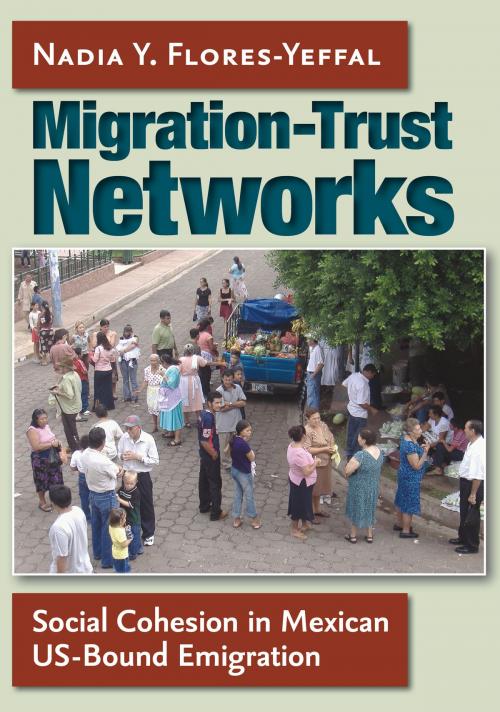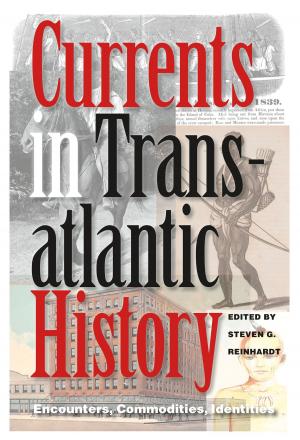Migration-Trust Networks
Social Cohesion in Mexican US-Bound Emigration
Nonfiction, Social & Cultural Studies, Social Science, Cultural Studies, Emigration & Immigration, Ethnic Studies, Sociology| Author: | Nadia Yamel Flores-Yeffal | ISBN: | 9781603449632 |
| Publisher: | Texas A&M University Press | Publication: | April 26, 2013 |
| Imprint: | Texas A&M University Press | Language: | English |
| Author: | Nadia Yamel Flores-Yeffal |
| ISBN: | 9781603449632 |
| Publisher: | Texas A&M University Press |
| Publication: | April 26, 2013 |
| Imprint: | Texas A&M University Press |
| Language: | English |
In an important new application of sociological theories, Nadia Y. Flores-Yeffal offers fresh insights into the ways in which social networks function among immigrants who arrive in the United States from Mexico without legal documentation. She asks and examines important questions about the commonalities and differences in networks for this group compared with other immigrants, and she identifies “trust” as a major component of networking among those who have little if any legal protection.
Revealing the complexities behind social networks of international migration, Migration-Trust Networks: Social Cohesion in Mexican US-Bound Emigration provides an empirical and theoretical analysis of how social networks of international migration operate in the transnational context. Further, the book clarifies how networking creates chain migration effects observable throughout history.
Flores-Yeffal’s study extends existing social network theories, providing a more detailed description of the social micro- and macrodynamics underlying the development and expansion of social networks used by undocumented Mexicans to migrate and integrate within the United States, with trust relationships as the basis of those networks. In addition, it incorporates a transnational approach in which the migrant’s place of origin, whether rural or urban, becomes an important variable. Migration-Trust Networks encapsulates the new realities of undocumented migration from Latin America and contributes to the academic discourse on international migration, advancing the study of social networks of migration and of social networks in general.
Revealing the complexities behind social networks of international migration, Migration-Trust Networks: Social Cohesion in Mexican US-Bound Emigration provides an empirical and theoretical analysis of how social networks of international migration operate in the transnational context. Further, the book clarifies how networking creates chain migration effects observable throughout history.
Flores-Yeffal’s study extends existing social network theories, providing a more detailed description of the social micro- and macrodynamics underlying the development and expansion of social networks used by undocumented Mexicans to migrate and integrate within the United States, with trust relationships as the basis of those networks. In addition, it incorporates a transnational approach in which the migrant’s place of origin, whether rural or urban, becomes an important variable. Migration-Trust Networks encapsulates the new realities of undocumented migration from Latin America and contributes to the academic discourse on international migration, advancing the study of social networks of migration and of social networks in general.
In an important new application of sociological theories, Nadia Y. Flores-Yeffal offers fresh insights into the ways in which social networks function among immigrants who arrive in the United States from Mexico without legal documentation. She asks and examines important questions about the commonalities and differences in networks for this group compared with other immigrants, and she identifies “trust” as a major component of networking among those who have little if any legal protection.
Revealing the complexities behind social networks of international migration, Migration-Trust Networks: Social Cohesion in Mexican US-Bound Emigration provides an empirical and theoretical analysis of how social networks of international migration operate in the transnational context. Further, the book clarifies how networking creates chain migration effects observable throughout history.
Flores-Yeffal’s study extends existing social network theories, providing a more detailed description of the social micro- and macrodynamics underlying the development and expansion of social networks used by undocumented Mexicans to migrate and integrate within the United States, with trust relationships as the basis of those networks. In addition, it incorporates a transnational approach in which the migrant’s place of origin, whether rural or urban, becomes an important variable. Migration-Trust Networks encapsulates the new realities of undocumented migration from Latin America and contributes to the academic discourse on international migration, advancing the study of social networks of migration and of social networks in general.
Revealing the complexities behind social networks of international migration, Migration-Trust Networks: Social Cohesion in Mexican US-Bound Emigration provides an empirical and theoretical analysis of how social networks of international migration operate in the transnational context. Further, the book clarifies how networking creates chain migration effects observable throughout history.
Flores-Yeffal’s study extends existing social network theories, providing a more detailed description of the social micro- and macrodynamics underlying the development and expansion of social networks used by undocumented Mexicans to migrate and integrate within the United States, with trust relationships as the basis of those networks. In addition, it incorporates a transnational approach in which the migrant’s place of origin, whether rural or urban, becomes an important variable. Migration-Trust Networks encapsulates the new realities of undocumented migration from Latin America and contributes to the academic discourse on international migration, advancing the study of social networks of migration and of social networks in general.
More books from Texas A&M University Press
We use our own "cookies" and third party cookies to improve services and to see statistical information. By using this website, you agree to our Privacy Policy















